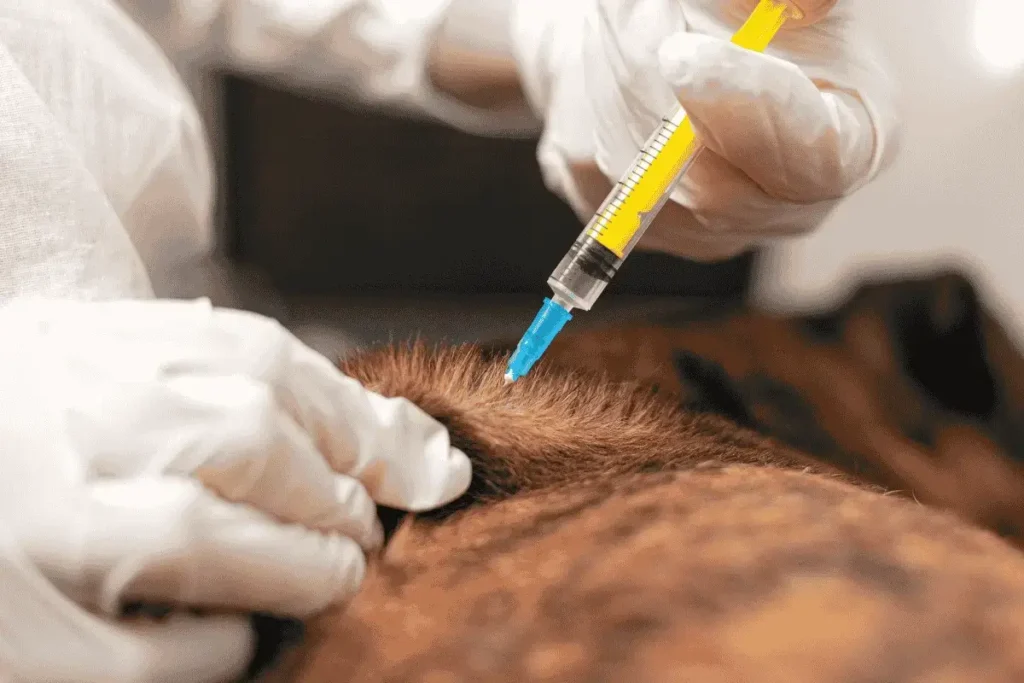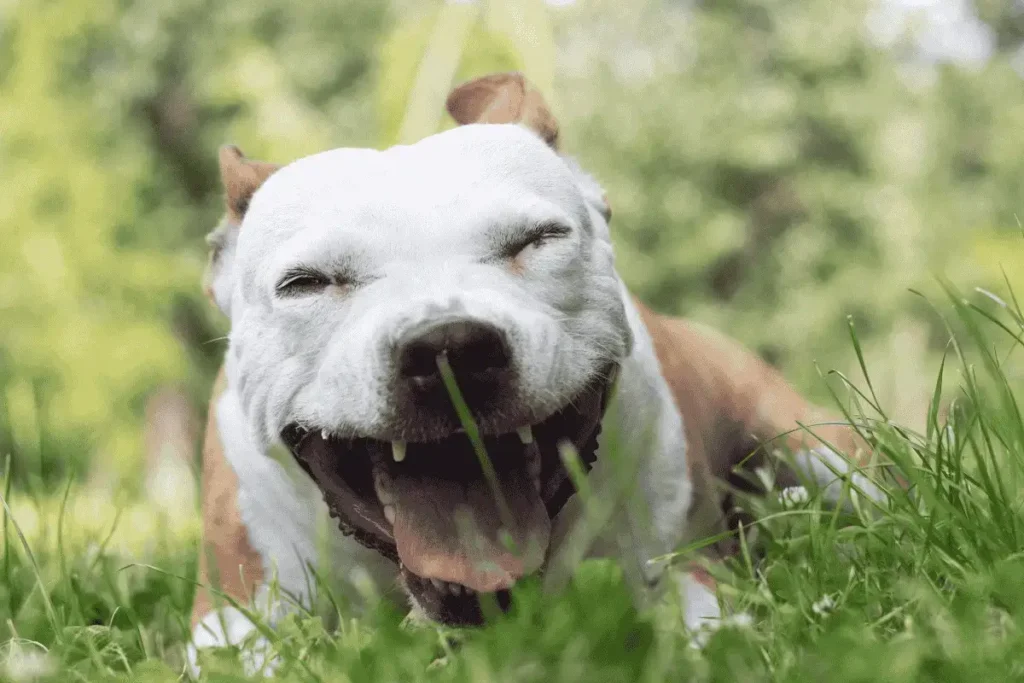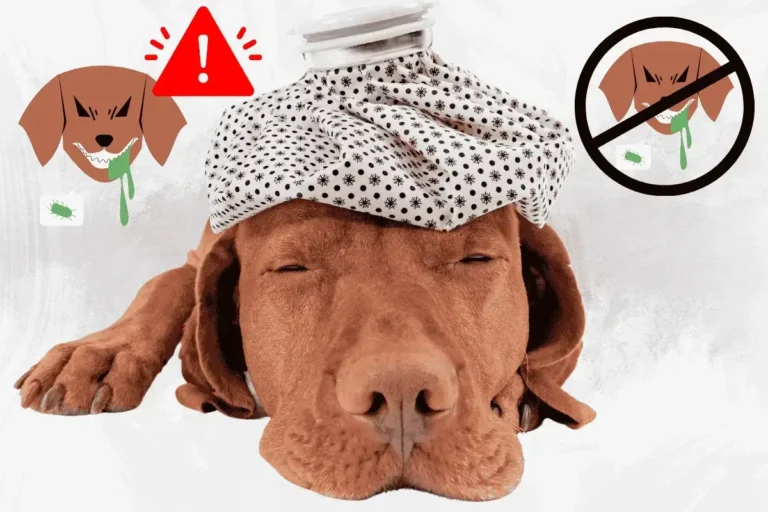Why Dog Coughing And Sneezing: Causes and Prevention
Have you ever wondered why your dog might cough or sneeze? It’s normal for dogs to cough or sneeze sometimes. But if it keeps happening, it could mean they’re sick and need help fast. Knowing why dogs get sick and how to stop it can keep them healthy and happy.

Key Takeaways
- Dog coughing and sneezing can be caused by various factors, including respiratory infections, allergies, heart disease, and environmental irritants.
- Identifying the type of cough (wet or dry) and accompanying symptoms can help determine the severity and potential causes of the issue.
- Seeking prompt veterinary care is crucial if symptoms persist for more than two days to prevent potential health complications.
- Regular check-ups, essential vaccinations, and lifestyle modifications can help prevent and manage respiratory issues in dogs.
- Understanding the different causes of dog coughing and sneezing can help pet owners take proactive steps to keep their furry friends healthy.
Understanding Different Types of Dog Coughs and Their Significance
Knowing about the different dog coughs can help you understand your pet’s health better. Dog coughs can be wet or dry, each pointing to different health issues.
Wet vs. Dry Coughs in Dogs
A wet cough might mean there’s fluid in your dog’s lungs or airways. This could be due to infections or other health problems. A dry cough, however, usually means irritation or inflammation in the respiratory system. This can be caused by allergies, environmental factors, or even heart disease.
Distinguishing Between Coughs and Reverse Sneezing
It’s critical to tell the difference between a cough and a reverse sneeze. Reverse sneezing is a unique event caused by nasal irritation. It’s characterized by a quick, forceful inhalation through the nose, followed by a sound like a snort or gasp.
When Dog Coughing and sneezing Becomes a Concern
If your dog coughs for over two days and shows other signs like tiredness, loss of appetite, or trouble breathing, get vet help immediately. Continuous coughing can be a sign of a severe issue. Quick medical care can help find the cause and treat it.
| Type of Cough | Possible Causes |
|---|---|
| Wet Cough | Respiratory infections, fluid in the lungs or airways |
| Dry Cough | Irritation, inflammation, allergies, environmental factors, heart disease |
Understanding dog coughs and their meanings helps you keep an eye on your pet’s breathing. This knowledge lets you act fast if your pet needs vet care. It’s all about keeping your furry friend healthy and supporting their breathing.
Common Causes of Dog Coughing and Sneezing
When your dog coughs or sneezes, it’s vital to know why. Respiratory infections, both viral and bacterial, can cause these symptoms. Allergies, kennel cough, heart disease, and environmental irritants also lead to coughing and sneezing.
Parasitic infections like heartworms and lungworms can make dogs cough. Sometimes, foreign objects in the airways or certain cancers can also cause respiratory issues.
Finding out why your dog is coughing or sneezing is crucial. It helps your vet treat your pet properly. Talking to your vet is the best step to ensure your dog’s respiratory health.
Common Causes of Dog Sneezing
- Inhaling irritants like dust, pollen, or cleaning products
- Bacterial or fungal infections, which might lead to nasal discharge
- Nasal mites, tiny parasites that can cause sneezing and bloody discharge
- Nasal tumors, though rare, can lead to chronic mucous discharge and facial deformities.
- Primary nosebleeds, potentially caused by clotting problems or exposure to toxins.
Common Causes of Dog Coughing
- Kennel cough, a highly contagious respiratory disease
- Heart disease, which can cause coughing, especially at rest or during the night
- Heartworms, transmitted by mosquito bites, which can lead to severe health issues
- Respiratory infections, both viral and bacterial
- Environmental irritants and allergies
If your dog coughs or sneezes a lot, see a vet. Early diagnosis and treatment are vital for your pet’s health.
“Continuous coughing for more than a few days indicates a potential serious condition. Any difficulty breathing, wheezing, or high-pitched sounds while breathing require immediate attention.”
Respiratory Infections and Their Impact on Dogs
Dog owners need to know about the respiratory infections that can hit their pets. These infections come from viruses, bacteria, or fungi. They can really hurt a dog’s health. It’s critical to know the different types and their signs to catch them early.
Viral Infections
Viral infections, like canine Influenza, can cause significant problems for dogs. They might cough, have a fever, or run a nose. This virus spreads fast among dogs, especially in places like dog parks. Quick vet care and support are vital for these infections.
Bacterial Infections
Bacterial infections, like pneumonia, can make dogs very sick. They might cough, have trouble breathing, or feel really tired. Vets give antibiotics to fight these infections and keep them from getting worse.
Fungal Infections
Fungal infections are rare but serious for dogs. They can cause coughing, wheezing, and weight loss. Quick diagnosis and the right medicine are vital to treating these infections.
Dog owners must watch for any signs of trouble in their pets. If you see any respiratory issues, get vet help fast. Early action can make a big difference in a dog’s recovery.
| Respiratory Infection | Symptoms | Treatment Approach |
|---|---|---|
| Canine Influenza | Coughing, fever, nasal discharge | Supportive care, antiviral medications (if available) |
| Bacterial Pneumonia | Coughing, difficulty breathing, lethargy | Antibiotic therapy prescribed by a veterinarian |
| Fungal Respiratory Infections | Coughing, wheezing, weight loss | Antifungal medications prescribed by a veterinarian |
“Early testing and treatment for dogs showing symptoms of respiratory illness can potentially improve their outcome.”
– Brian Collins, Cornell University’s Riney Canine Health Center
Knowing about respiratory infections and their signs helps dog owners a lot. Regular vet visits, keeping up with shots, and quick action on any issues are all important. They help keep our dogs healthy and happy.
Kennel Cough: A Primary Concern for Dog Owners
As a pet parent, you might have heard of “kennel cough.” It’s a contagious respiratory condition that can hit your dog. Kennel cough, or canine infectious respiratory disease (CIRD), is common in crowded places like dog parks and training centers.
The leading causes are Bordetella bronchiseptica bacteria and viruses like the canine parainfluenza virus. When infected dogs cough or sneeze, they spread the disease to others nearby.
Symptoms are signs of a dry, hacking cough and sometimes white foam. While usually mild, it can be severe in puppies, older dogs, or those with weak immune systems. Untreated, it can lead to pneumonia.
Vets diagnose kennel cough by looking at symptoms and where the dog is. They might take swabs or use X-rays to check for other issues.
Treatment includes antibiotics, anti-inflammatory meds, and cough suppressants. Dogs with kennel cough are contagious for 2-3 weeks, so keep them away from other dogs.
Home remedies like probiotics, honey, and cinnamon might help. But always talk to your vet before trying anything at home. Proper care is critical to your dog’s recovery and stopping the disease from spreading.
To prevent kennel cough, keep your dog’s vaccinations up to date. Avoid high-risk places and practice good hygiene. These actions can help keep your dog healthy and happy.

Remember, kennel cough is a big worry, but with the proper care, your dog can get better. Knowing the causes, symptoms, and how to prevent it can help keep our dogs safe and healthy.
Heart Disease and Related Respiratory Issues
Heart disease can cause significant problems for dogs’ breathing. Conditions like mitral valve disease, congestive heart failure, and pulmonary hypertension can lead to coughing and breathing issues.
Mitral Valve Disease
Mitral valve endocarditis is a common heart problem in dogs. It makes the mitral valve leak, causing blood to go back and fluid to build up in the lungs. This leads to a constant cough. Treatment includes medicines to help the heart work better and reduce fluid.
Congestive Heart Failure
As heart disease gets worse, it can lead to congestive heart failure. This makes the heart weak, causing fluid to build up in the lungs and body. Dog with this condition may cough, especially when they’re active or resting. Medicines and diet changes can help manage this and its breathing symptoms.
Pulmonary Hypertension
Pulmonary hypertension is high blood compression in the lungs. It can cause coughing, fainting, and shortness of breath in dogs. It often comes from other heart or lung diseases. Treatment aims to reduce the heart’s workload and manage the underlying issue.
If your dog keeps coughing or has trouble breathing, see a vet. They can find out why and help manage heart disease and breathing problems.
Environmental Factors and Allergic Reactions
Dog owners need to know that the environment can affect their pets’ breathing. Things like dust, pollen, smoke, and certain foods can make dogs cough, sneeze, and wheeze. Even human or animal dander can be a problem.
Allergies in dogs are common and often lead to vet visits. Many dogs develop allergies to things in their environment, food, or other allergens. Food allergies are less common but can cause severe reactions.
Flea Allergy Dermatitis (FAD) is a common allergy in dogs. It’s when a dog reacts to flea saliva. Skin allergies, or Atopic Dermatitis, are often caused by environmental allergens. This leads to itchy skin, scratching, and infections.
Pollen, fleas, dust mites, mold spores, and certain foods are common allergens for dogs. Household products, fabrics, perfumes, and deodorants can also cause allergies. Vets use medical history, physical exams, and tests like blood or skin prick tests to diagnose allergies.
Treatment for dog allergies includes antihistamines, corticosteroids, and topical treatments. Changing their diet or using immunotherapy can also help. Early treatment can significantly improve a dog’s life with allergies.
Managing Dog Allergies
- Eliminate allergens from the environment, such as using air cleaners and humidifiers.
- Regularly clean and vacuum to minimize exposure to irritants.
- In severe cases, bronchodilators, anti-inflammatory drugs, and immunomodulatory medications may be prescribed.
Understanding common environmental triggers and managing dog allergies can help pets breathe better. It ensures they live healthier lives.

Prevention Strategies and Vaccination Requirements
Keeping your dog’s respiratory health in check is a big job. It involves vaccinations, lifestyle changes, and regular vet visits. These steps are crucial to protecting your dog from common respiratory problems.
Essential Vaccines
Vaccines are vital for preventing respiratory diseases in dogs. It would help if you got your dog vaccinated against kennel cough, canine Influenza, and core diseases like DHPP. These shots boost your dog’s immune system and lessen symptoms if they get sick.
Lifestyle Modifications
Changing your dog’s lifestyle can also help their respiratory health. Please stay away from places where dogs might get sick, keep them clean, and avoid harmful air. A clean, well-ventilated home can also stop the spread of illnesses.
Regular Health Check-ups
Regular vet visits are crucial for catching and treating respiratory problems early. Your vet can check your dog’s breathing, find any health issues, and suggest treatments. Make sure your dog’s vaccinations are current, especially before going to dog parks or boarding facilities.
| Vaccine | Purpose | Frequency |
|---|---|---|
| Bordetella (Kennel Cough) | Protects against a highly contagious respiratory infection | Booster every 6-12 months |
| Canine Influenza | Targets the H3N8 and H3N2 canine influenza viruses | Annual booster |
| DHPP (Distemper, Hepatitis, Parainfluenza, Parvovirus) | Core vaccines that protect against multiple diseases | Initial series, then booster every 1-3 years |
By being proactive with your dog’s care, you can lower the risk of respiratory infections. This affirms your dog stays healthy and happy for years to come.
Treatment Options and Home Care Tips
Dealing with your dog’s coughs and sneezes depends on the cause. It’s essential to keep them hydrated, rested, and fed well. For infections, antibiotics might be needed for bacteria, while viruses need symptom relief.
Home remedies like a humidifier can help. Also, avoid tight collars and keep your home clean and smoke-free. For long-term issues like tracheal collapse, ongoing care is critical.
Always talk to your vet if your dog’s symptoms don’t get better. They can find the proper treatment and suggest home remedies to help your dog breathe better.
FAQ
What are the common causes of dog coughing and sneezing?
Dog coughing and sneezing can be caused by many things. This includes respiratory infections, allergies, heart disease, and environmental irritants.
How can I tell if my dog’s cough is wet or dry, and why does it matter?
A wet cough might mean there’s fluid in your dog’s lungs or airways. A dry cough could be due to irritation or inflammation. Knowing the type of cough helps you figure out what’s wrong.
When should I be concerned about my dog’s coughing and sneezing?
If your dog coughs for more than two days and shows signs like being tired, not wanting to eat, or having trouble breathing, you should see a vet right away.
What are the common respiratory infections that can cause coughing and sneezing in dogs?
Bacteria, Viruses, or fungi can cause respiratory infections. They can affect the upper respiratory tract, lung tissue, or airways, leading to symptoms like coughing and sneezing.
What is kennel cough, and how can I prevent my dog from getting it?
Kennel cough, or Canine Infectious Respiratory Disease (CIRD), is a contagious respiratory condition. It often affects dogs in crowded places. Vaccination and avoiding crowded areas are vital to preventing it.
How can heart disease in dogs lead to respiratory symptoms?
Heart conditions like mitral valve endocarditis, dilated cardiomyopathy, and congestive heart failure can cause coughing. Treatment usually involves medications to help the heart work better and reduce fluid buildup.
What environmental factors and allergies can affect a dog’s respiratory health?
Common allergens include dust, pollen, smoke, certain foods, and dander from humans or animals. These can cause coughing, sneezing, and other respiratory symptoms. Managing allergies may involve removing allergens and using medication.
What can I do to prevent respiratory issues in my dog?
To prevent respiratory issues, make sure your dog is up-to-date on vaccinations. Avoid high-risk environments, keep your dog clean, and reduce exposure to irritants.
How can I treat my dog’s coughing and sneezing at home?
Supportive care, like ensuring your dog drinks enough water, rests, and has a clean environment, can help. For some conditions, cough suppressants and anti-inflammatory medications may be needed. Always consult a vet for the correct diagnosis and treatment.




